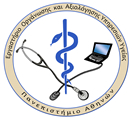Symptoms
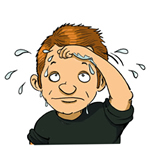 1. Fever 1. Fever
|
| |
 2. Cough 2. Cough
|
| |
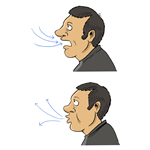 3. Rapid breathing or difficulty breathing 3. Rapid breathing or difficulty breathing
|
| |
 4. Fatigue 4. Fatigue
|
| |
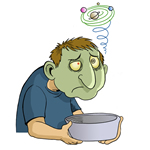 5. Νausea 5. Νausea
|
| |
 6. Vomiting 6. Vomiting
|
| |
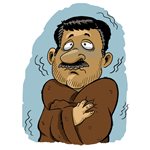 7. Chills 7. Chills
|
| |
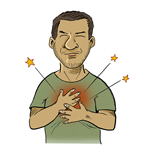 8. Chest pain 8. Chest pain
|
Τhe symptoms of pneumonia can develop quickly (in 24 – 48 hours) or later, following several days.
Transmission
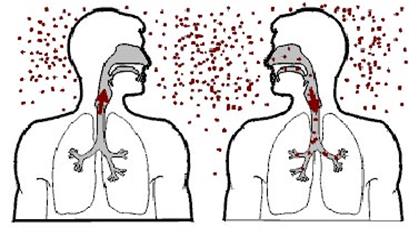
Pneumonia is transmitted from person to person through airborne droplets when the patient coughs, sneezes or talks. Also, rarely, pneumonia may be caused by the aspiration of vomit, of a foreign body e.g. a peanut, or of a harmful substance such as fume or chemicals.
Treatment
For the treatment of the disease seek medical advice. Mild pneumonia usually can be treated at home with antibiotics, rest and taking lots of fluids. Individuals with other health problems may require hospital admission as pneumonia may lead to severe complications.
Prevention

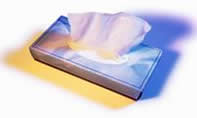

People who are more likely to get pneumonia are adults ≥65 years and children <5 years old. Individuals aged under 64 years with health problems (e.g. diabetes, HIV/AIDS) and individuals aged 19 – 64 years who smoke or have asthma are also at increased risk of getting pneumonia. Pneumonia can be prevented with vaccination. Also, you may lower pneumonia risk by reducing your exposure to cigarette smoking and taking therapy or prophylaxis for diseases such as diabetes mellitus and HIV/AIDS.
In order to avoid the spreading of pneumonia:
-
Wash your hands frequently. That way you protect yourself and the people around you.
-
Clean any surfaces that are frequently touched (such as door knobs and counters).
-
Cover your mouth and nose with a tissue when you cough or sneeze.
When to seek medical advice
If you have any symptoms of pneumonia you should see your doctor. If you have severe symptoms such as rapid breathing, chest pain or confusion, seek emergency medical assistance.
Vaccines
Τhe pneumococcal vaccine (PCV) is recommended for all healthy children ≤ 5 years, with the youngest age of administration being 6 weeks. The vaccine PPSV is recommended in addition to PCV at least 2 months following the last dose of PCV in children > 2 years old if they are at increased risk for severe pneumococcal infections.
For Individuals aged over 50 years, vaccination is recommended in a single dose of PCV-13. For individuals aged 19-50 years, 1-2 doses of the PPSV vaccine are recommended if these individuals are at increased risk for severe pneumococcal infections (e.g. chronic renal insufficiency, diabetes mellitus, heart disease with severe disturbances, chronic lung diseases, chronic smoking etc.).
References
nhs
cdc
National Immunization Program for Children and Adolescents 2011 References




















